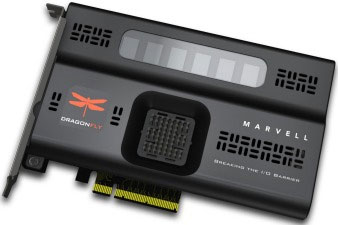 ComputerWorld reports that Solid-state drive chip maker Marvell Technology announced that later this year it will release an accelerator card designed to deliver a tenfold increase in storage network throughput by caching and sorting data at the server before sending it to back-end arrays.
ComputerWorld reports that Solid-state drive chip maker Marvell Technology announced that later this year it will release an accelerator card designed to deliver a tenfold increase in storage network throughput by caching and sorting data at the server before sending it to back-end arrays.
The new product, the DragonFly Virtual Storage Accelerator (VSA), was designed for the virtualized server environments that have been saturating storage networks in recent years, Marvell said in an announcement at the Storage Networking World conference here.
"Virtualization solved a big problem in past: It addressed low server utilization rates. But it also created a new problem: When you have many virtual machines in a server, it can bottleneck performance on one of three things -- the CPU, the network bandwidth or storage I/O," said Shawn Kung, Marvell's director of product marketing.
The DragonFly Virtual Storage Accelerator
The number of chip sockets is increasing, clock speeds are improving and Gigabit Ethernet LANs are growing more common -- therefore the biggest performance problem typically lies with storage I/O, Kung explained.
"Even if each individual [virtual machine] has a workload profile that's sequential, the combination of so many VMs all trying to write I/O to the back end results in the arrays seeing a very highly randomized write pattern," Kung said.
The DragonFly VSA card comes in a PCI Express (PCIe) form factor, allowing it to be used in servers regardless of the protocol used to attach to back-end storage, Kung said.
The DragonFly is powered by what Marvell calls its "HyperScale" embedded processor technology, an ASIC (application-specific integrated circuit) that controls nonvolatile RAM as L1 cache and SSD chips as L2 cache to maintain highly consistent writes by placing them in sequential order, according to Kung.
Gole was referring to the fact that NAND flash memory in SSDs requires that every time a new data write comes in from a host system, an old block of data on the memory must be marked for deletion -- a process known as the erase-write cycle. When all blocks have been written to, firmware in the controller then sets about deleting data in stale blocks -- a process known as garbage collection. Garbage collection can severely hamper the performance of SSDs over time, and flash drives can only sustain so many erase-write cycles -- typically 10,000 for consumer-class drives and 100,000 for enterprise-class drives.
Gole also pointed out that, unlike storage acceleration appliances that use SSDs and in some cases DRAM as a cache in front of storage arrays, the DragonFly VSA scales linearly because as more cards are added to servers, the processing and storage capacity increases.
The DragonFly VSA is undergoing initial tests with select Marvell customers. It's expected to go into beta testing this summer and will be available about three months after that, Kung said. Pricing has yet to be set, he said, but added that the cards will sell for around the same price as a Fibre Channel host bus adapter -- or just over $1,000.
